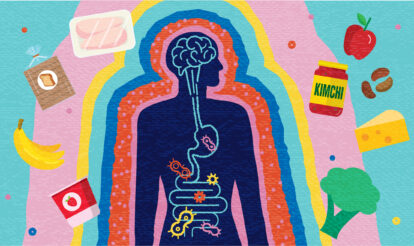
Digestive Side Effects of the Keto Diet: How Probiotics Can Help
Digestive Side Effects of the Keto Diet: How Probiotics Can Help

The keto (ketogenic) diet is based on a very low carbohydrate, high-fat eating pattern. By restricting carbs, your body enters a state of ketosis, which means you burn fat for fuel instead of glucose. For some people, eating this way has potential health benefits.
However, keto has some downsides too, such as unpleasant digestive symptoms and potentially negative effects for your gut microbiome. That’s important because your gut microbiome plays an important role in maintaining your long-term digestive and immune health. There is also evidence that your microbiome influences your weight and risk for weight-related diseases.¹,²
Here’s what to expect and the steps you can take to reduce the impact on your gut when following the keto diet.
Why Keto Affects Your Gut
For many people, the keto diet is a drastic change from their usual way of eating as it means eating 70-80% of your calories as fat. It includes lots of fatty fish, high-fat meats, avocados, oil, butter, and heavy cream.
In addition, carbohydrates are limited to less than 50 grams per day. Carbs don’t only come from desserts and sweetened beverages but also from healthy, fibre-rich foods such as:
-
Fruits and vegetables
-
Whole grains
-
Legumes.
It’s not uncommon to experience digestive issues, especially diarrhea and constipation in the initial stages of this diet, resulting from the sudden change in the way you eat. High-fat foods can be harder to digest and move more slowly through your GI tract. This can cause nausea, vomiting, stomach cramps, and diarrhea. And because it’s low in carbs, the keto diet is also often low in fibre, contributing to constipation.³,⁴
Most of these symptoms usually improve by the fourth week on the keto diet.³,⁴ Still, many people continue to experience constipation while they’re on the diet.⁵
Keto Diets and Your Gut Microbiome
These potential side effects of the keto diet can result in unhealthy changes to your gut microbiome – the trillions of friendly bacteria and other microorganisms that live in your digestive tract. A healthy, diverse microbiome plays a vital role in:¹,²
- Stimulating your immune system
- Producing certain vitamins and other health-promoting compounds
- Helping digest certain foods
- Maintaining a healthy intestinal lining
- Influencing how your body burns and uses calories from foods you eat
The keto diet might cause changes in your microbiome because the microbes in your gut also have to eat. Their preferred food is fibre from carbohydrate-rich plant foods, something you may not get enough of on a keto diet.
Studies show increasing dietary fat from 20% to 40% (a typical Western diet) leads to unfavorable microbiome changes such as less microbial diversity.⁶ That may affect the health of your digestive tract and immune system in particular. A reduction in microbial diversity contributes to dysbiosis. Dysbiosis means the mix of microbes in your gut becomes unbalanced with more unfriendly microorganisms and fewer beneficial ones. Over the long term, dysbiosis can have undesirable long-term effects on your health.
A keto diet is closer to 75% fat, and it too reduces microbiome diversity quickly.⁷ There is very little information on the long term effects of keto on the microbiome, but some of the research that has been done is surprising. One study shows that ketosis might have the opposite effect of a Western high fat diet. Specifically, animal studies show that staying in ketosis can reduce inflammation in the gut. Also, health effects like weight loss or improved blood sugar from ketosis, seem to increase beneficial bacteria over time.⁸ Still, it’s not clear if these results would apply to everyone who follows the keto diet, or if other factors, like the length of time on the diet or specific foods you eat while on the diet affect the microbiome changes.
Experts do believe the type of fats you eat on the keto diet play a role in how your microbiome changes. Eating more saturated fats from foods such as red meat or bacon causes unfavorable changes. However, eating primarily polyunsaturated fats from oily fish, nuts, and seeds doesn’t seem to change the microbiome’s richness and diversity.⁹
Artificial sweeteners may also impact your microbiome. Since sugar is off limits on keto, many people rely on artificial sweeteners to satisfy their sweet tooth.Some studies show that using large amounts of these sweeteners contributes to microbiome changes and disruptions in healthy bacteria. There is some evidence that these microbiome changes might increase your risk of diabetes and heart disease.⁹, ¹⁰
Probiotics and the Keto Diet
Taking a daily probiotic is an important way to protect your gut microbiome from any adverse effects of the keto diet.⁹
Probiotics are live bacteria and yeasts that provide health benefits when you take them at recommended doses. The bacteria and yeasts in probiotics are the same or similar to those found in a healthy microbiome. Taking a probiotic is a safe and effective way to enhance or restore your microbiome.
Cultured and fermented foods such as yogurt, sauerkraut, and kimchi also provide live bacteria, although not in the same consistent and high amounts as probiotics. Still, some experts recommend adding cultured foods to a keto diet when possible.⁹
Probiotics work best when paired with prebiotics; these are the indigestible compounds found in many plant foods. Prebiotics are a source of food, or fertiliser, for your probiotics. Some prebiotic-rich foods, such as oats, barley, and under-ripe bananas, aren’t keto-friendly, so choose lower-carb prebiotic foods such as: ¹¹,¹²
-
Onions (small amount)
-
Leeks
-
Garlic
-
Asparagus
-
Mushrooms.
Also, some probiotic manufacturers pair prebiotics with probiotics. These are known as synbiotics, and they’re a very effective way to get both in one supplement.
Other Diet Strategies
While a good probiotic with prebiotics should be a starting point to protect and enhance your digestive health while on the keto diet, don’t overlook other diet strategies. One of the best ways to combat constipation and support healthy gut microbes is to increase your fibre consumption. Load up on as many low-carb vegetables and fruits as you can each day while staying within your carbohydrate goals. Also, make sure you drink plenty of water because it keeps things moving through your digestive tract.
When planning meals and snacks, focus on nuts, seeds, and oily fish such as salmon or sardines. These are all sources of healthy polyunsaturated fats that can help maintain a healthy and diverse microbiome.
Finally, try to limit your use of artificial sweeteners. A small amount is fine to satisfy your sweet tooth once in a while, but don’t go overboard because of the potential effects they might have on your gut health.
Together, healthy diet choices and a good probiotic can ease your transition into the keto diet and help maintain a healthy gut for the long term.
1. Hibberd AA, Yde CC, Ziegler ML, Honoré AH, Saarinen MT, Lahtinen S, Stahl B, Jensen HM, Stenman LK. Probiotic or synbiotic alters the gut microbiota and metabolism in a randomised controlled trial of weight management in overweight adults. Beneficial microbes. 2019 Mar 13;10(2):121-35.https://pubmed.ncbi.nlm.nih.gov/30525950/
2. Jandhyala SM, Talukdar R, Subramanyam C, Vuyyuru H, Sasikala M, Nageshwar Reddy D. Role of the normal gut microbiota. World J Gastroenterol. 2015;21(29):8787-8803. doi:10.3748/wjg.v21.i29.8787 https://www.ncbi.nlm.nih.gov/pmc/articles/PMC4528021/
3. d C Harvey CJ, Schofield GM, Williden M, McQuillan JA. The effect of medium chain triglycerides on time to nutritional ketosis and symptoms of keto-induction in healthy adults: a randomised controlled clinical trial. Journal of nutrition and metabolism. 2018 May 22;2018. https://www.hindawi.com/journals/jnme/2018/2630565/
4. Ruiz Herrero J, Cañedo Villarroya E, García Peñas JJ, et al. Safety and Effectiveness of the Prolonged Treatment of Children with a Ketogenic Diet. Nutrients. 2020;12(2):306. Published 2020 Jan 24. doi:10.3390/nu12020306 https://www.ncbi.nlm.nih.gov/pmc/articles/PMC7082414/
5. Wibisono C, Rowe N, Beavis E, Kepreotes H, Mackie FE, Lawson JA, Cardamone M. Ten-Year Single-Center Experience of the Ketogenic Diet: Factors Influencing Efficacy, Tolerability, and Compliance. The Journal of Pediatrics. 2015 Apr 1;166(4):1030-6. https://pubmed.ncbi.nlm.nih.gov/25649120/
6. Wan Y, Wang F, Yuan J, Li J, Jiang D, Zhang J, Li H, Wang R, Tang J, Huang T, Zheng J. Effects of dietary fat on gut microbiota and faecal metabolites, and their relationship with cardiometabolic risk factors: a 6-month randomised controlled-feeding trial. Gut. 2019 Aug 1;68(8):1417-29. https://pubmed.ncbi.nlm.nih.gov/30782617/
7. Zhang Y, Zhou S, Zhou Y, Yu L, Zhang L, Wang Y. Altered gut microbiome composition in children with refractory epilepsy after ketogenic diet. Epilepsy research. 2018 Sep 1;145:163-8. https://pubmed.ncbi.nlm.nih.gov/30007242/
8. Reddel S, Putignani L, Del Chierico F. The Impact of Low-FODMAPs, Gluten-Free, and Ketogenic Diets on Gut Microbiota Modulation in Pathological Conditions. Nutrients. 2019;11(2):373. Published 2019 Feb 12. doi:10.3390/nu11020373
9. Paoli A, Mancin L, Bianco A, Thomas E, Mota JF, Piccini F. Ketogenic Diet and Microbiota: Friends or Enemies?. Genes (Basel). 2019;10(7):534. Published 2019 Jul 15. doi:10.3390/genes10070534 https://www.ncbi.nlm.nih.gov/pmc/articles/PMC6678592/
10. Ruiz-Ojeda FJ, Plaza-Díaz J, Sáez-Lara MJ, Gil A. Effects of Sweeteners on the Gut Microbiota: A Review of Experimental Studies and Clinical Trials [published correction appears in Adv Nutr. 2020 Mar 1;11(2):468]. Adv Nutr. 2019;10(suppl_1):S31-S48. doi:10.1093/advances/nmy037 https://www.ncbi.nlm.nih.gov/pmc/articles/PMC6363527/
11. Carlson JL, Erickson JM, Lloyd BB, Slavin JL. Health Effects and Sources of Prebiotic Dietary Fiber. Curr Dev Nutr. 2018;2(3):nzy005. Published 2018 Jan 29. doi:10.1093/cdn/nzy005 https://www.ncbi.nlm.nih.gov/pmc/articles/PMC6041804/
12. Al-Sheraji SH, Ismail A, Manap MY, Mustafa S, Yusof RM, Hassan FA. Prebiotics as functional foods: A review. Journal of functional foods. 2013 Oct 1;5(4):1542-53.




